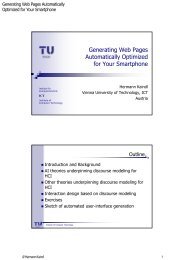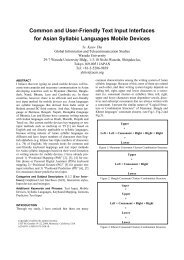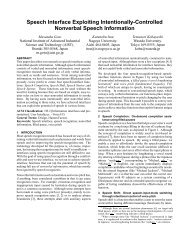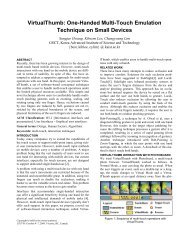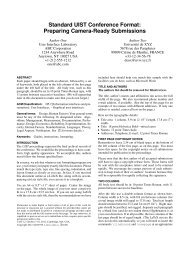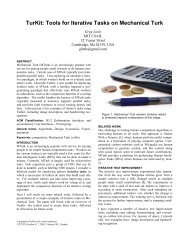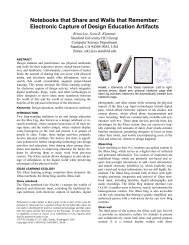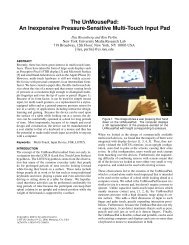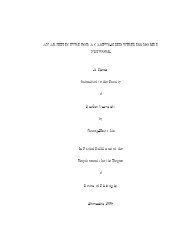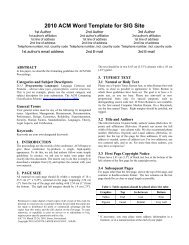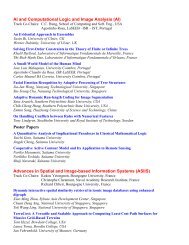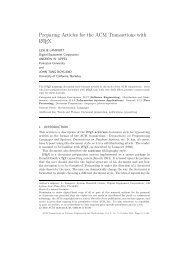API Design Matters Stonebraker and Seltzer - RabbitMQ
API Design Matters Stonebraker and Seltzer - RabbitMQ
API Design Matters Stonebraker and Seltzer - RabbitMQ
Create successful ePaper yourself
Turn your PDF publications into a flip-book with our unique Google optimized e-Paper software.
sufficient because it can be used to implement the func-<br />
tionality of the first three. There is also waitid(), which<br />
could almost, but not quite, be implemented in terms of<br />
wait4(). The caller has to read the documentation for all<br />
five functions in order to work out which one to use. It<br />
would be simpler <strong>and</strong> easier for the caller to have a single<br />
combined function instead. This is also an example of<br />
how concerns about backward compatibility erode <strong>API</strong>s<br />
over time: the <strong>API</strong> accumulates crud that, eventually, does<br />
more damage than the good it ever did by remaining<br />
backward compatible. (And the sordid history of stumbling<br />
design remains for all the world to see.)<br />
<strong>API</strong>s cannot be designed without an underst<strong>and</strong>ing<br />
of their context. Consider a class that provides access to<br />
a set of name–value pairs of strings, such as environment<br />
variables:<br />
class NVPairs {<br />
public string lookup(string name);<br />
// ...<br />
}<br />
The lookup method provides access to the value stored<br />
by the named variable. Obviously, if a variable with the<br />
given name is set, the function returns its value. How<br />
should the function behave if the variable is not set?<br />
There are several options:<br />
• Throw a VariableNotSet exception.<br />
• Return null.<br />
• Return the empty string.<br />
Throwing an exception is appropriate if the designer<br />
anticipates that looking for a variable that isn’t there<br />
is not a common case <strong>and</strong> likely to indicate something<br />
that the caller would treat as an error. If so, throwing an<br />
exception is exactly the right thing because exceptions<br />
force the caller to deal with the error. On the other h<strong>and</strong>,<br />
the caller may look up a variable <strong>and</strong>, if it is not set,<br />
substitute a default value. If so, throwing an exception is<br />
exactly the wrong thing because h<strong>and</strong>ling an exception<br />
breaks the normal flow of control <strong>and</strong> is more difficult<br />
than testing for a null or empty return value.<br />
Assuming that we decide not to throw an exception if<br />
a variable is not set, two obvious choices indicate that a<br />
lookup failed: return null or the empty string. Which one<br />
is correct? Again, the answer depends on the anticipated<br />
use cases. Returning null allows the caller to distinguish a<br />
variable that is not set at all from a variable that is set to<br />
the empty string, whereas returning the empty string for<br />
variables that are not set makes it impossible to distinguish<br />
a variable that was never set from a variable that<br />
more queue: www.acmqueue.com<br />
was explicitly set to the empty string. Returning null is<br />
necessary if it is deemed important to be able to make<br />
this distinction; but, if the distinction is not important, it<br />
is better to return the empty string <strong>and</strong> never return null.<br />
General-purpose <strong>API</strong>s should be “policy-free;” specialpurpose<br />
<strong>API</strong>s should be “policy-rich.” In the preceding<br />
guideline, I mentioned that correct design of an <strong>API</strong><br />
depends on its context. This leads to a more fundamental<br />
design issue—namely, that <strong>API</strong>s inevitably dictate policy:<br />
an <strong>API</strong> performs optimally only if the caller’s use of the<br />
<strong>API</strong> is in agreement with the designer’s anticipated use<br />
cases. Conversely, the designer of an <strong>API</strong> cannot help<br />
but dictate to the caller a particular set of semantics <strong>and</strong><br />
a particular style of programming. It is important for<br />
designers to be aware of this: the extent to which an <strong>API</strong><br />
sets policy has profound influence on its usability.<br />
If little is known about the context in which an <strong>API</strong><br />
is going to be used, the designer has little choice but to<br />
keep all options open <strong>and</strong> allow the <strong>API</strong> to be as widely<br />
applicable as possible. In the preceding lookup example,<br />
this calls for returning null for variables that are not set,<br />
because that choice allows the caller to layer its own<br />
policy on top of the <strong>API</strong>; with a few extra lines of code,<br />
the caller can treat lookup of a nonexistent variable as a<br />
hard error, substitute a default value, or treat unset <strong>and</strong><br />
empty variables as equivalent. This generality, however,<br />
comes at a price for those callers who do not need the<br />
flexibility because it makes it harder for the caller to treat<br />
lookup of a nonexistent variable as an error.<br />
This design tension is present in almost every <strong>API</strong>—the<br />
line between what should <strong>and</strong> should not be an error is<br />
very fine, <strong>and</strong> placing the line incorrectly quickly causes<br />
major pain. The more that is known about the context of<br />
an <strong>API</strong>, the more “fascist” the <strong>API</strong> can become—that is,<br />
the more policy it can set. Doing so is doing a favor to the<br />
caller because it catches errors that otherwise would go<br />
undetected. With careful design of types <strong>and</strong> parameters,<br />
errors can often be caught at compile time instead of<br />
being delayed until runtime. Making the effort to do this<br />
is worthwhile because every error caught at compile time<br />
is one less bug that can incur extra cost during testing or<br />
in the field.<br />
The Select() <strong>API</strong> fails this guideline because, by<br />
overwriting its arguments, it sets a policy that is in direct<br />
conflict with the most common use case. Similarly, the<br />
.NET Receive() <strong>API</strong> commits this crime for nonblocking<br />
sockets: it throws an exception if the call worked but no<br />
data is ready, <strong>and</strong> it returns zero without an exception if<br />
the connection is lost. This is the precise opposite of what<br />
the caller needs, <strong>and</strong> it is sobering to look at the mess of<br />
ACM QUEUE May/June 2007 31



